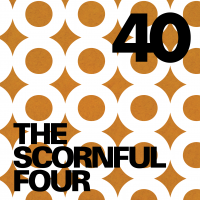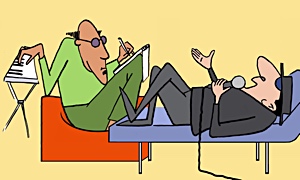Home » Jazz Articles » Mr. P.C.'s Guide to Jazz Etiquette and Bandstand Decorum » Vote P.C.!
Vote P.C.!

Will being in a swing state improve my swing playing?
—J.P., Atlanta
Dear J.P.:
On the surface, at least, this is pretty obvious. Right now I'm in a writing state, so I'm writing. Tonight I'll be in a reading state, so I'll read. If I were in a swing state, would I play swing? You bet! When else would I swing better? And for the same reason, if I were in a blue state I'd play the blues.
What's interesting is that there are actual parts of our country known as "swing states," and of course if you were living there, you'd always try to swing, whether you were in a mental swing state or not. You could still play other kinds of music; they'd just wind up swing-inflected, and that's not always a good thing. Take "swing state" Wisconsin, for example: When oom-pah-pah meets chang-chanka-chang, is it polka with a swing feel, swing with a polka feel, or some ungodly hybrid of the two?
It's cultural clashes like this that have brought "swing states" to the attention of political analysts. They've even co-opted the term, using it to describe any state where opposing factions are in an unhealthy and precarious balance.
Dear Mr. P.C.:
My family and I have moved around a lot over the years, and that leads to my question. Besides the usual repertoire, each jazz community has one or more extra tunes musicians are supposed to know. So maybe Portland likes "Stablemates" while Philly likes "Inner Urge" and Pittsburgh likes "Voyage." My question is, who decided these things? And how can they be changed?
—Tuned Out
Dear Tuned:
Instead of dragging your family from one state to another, wouldn't it be easier to just learn the "extra" tune where you're living? No matter where you are, "Satin Doll" and "Take the A Train" won't be enough, but that's no reason to pack up and leave.
What you're missing is the big picture: Tunes are just a bunch of notes and chords, then there are scales and licks that go over the chords, then the starting notes happen again, in the same order, at the end. The songs may have different names, but take out the starting notes and the game is the same: there are only twelve scale degrees, and you just have to play them fast enough that no one knows which is which.
If that doesn't work for you, you could do some research to find a city with an "extra" tune you happen to already know. But there's always a danger the city will change its tune, sending you and your family back into the night; tuneless jazz refugees in perpetual flight from the unknown.
Dear Mr. P.C.:
You know how when we were children we had to clear our plates because of the poor children in Third World countries who didn't have enough to eat? Well now every time I have a glut of gigs, I think of the poor musicians in Wyoming who have nowhere to play, and that shames me into playing every single gig I'm offered. Do I get points with you for that?
—Sated In San Francisco
Dear Sated:
If they're poor musicians, doesn't it make sense no one hires them? And what does Wyoming have to do with jazz—is it even a swing state?
Have a question for Mr. P.C.? Ask him.
Tags
PREVIOUS / NEXT
Support All About Jazz
 All About Jazz has been a pillar of jazz since 1995, championing it as an art form and, more importantly, supporting the musicians who make it. Our enduring commitment has made "AAJ" one of the most culturally important websites of its kind, read by hundreds of thousands of fans, musicians and industry figures every month.
All About Jazz has been a pillar of jazz since 1995, championing it as an art form and, more importantly, supporting the musicians who make it. Our enduring commitment has made "AAJ" one of the most culturally important websites of its kind, read by hundreds of thousands of fans, musicians and industry figures every month.























